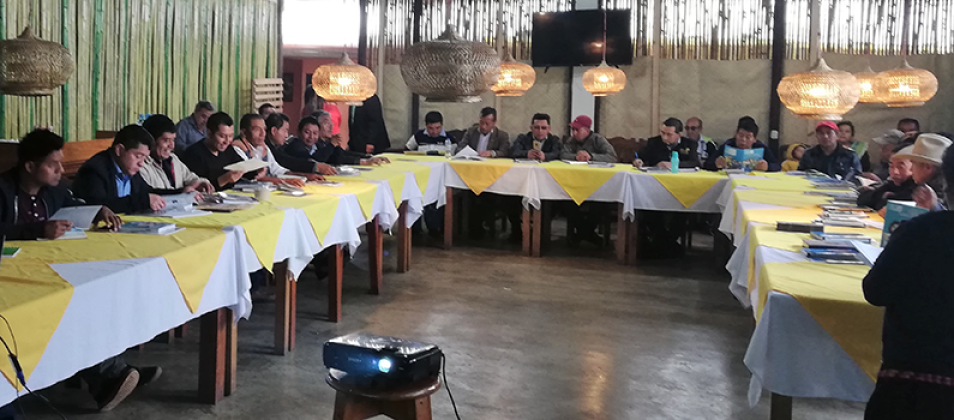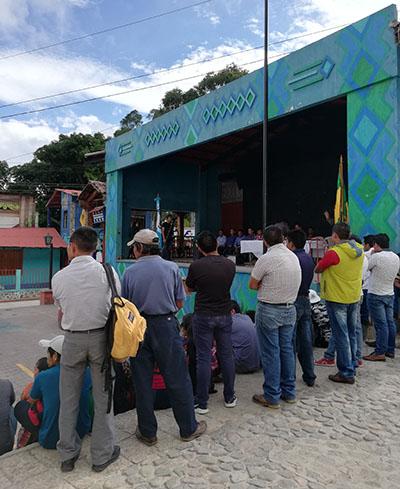
Guatemalan Political Parties in 42 Municipalities Commit to Peaceful Electoral Process
by Marit Björnlund*
On June 10 in Guatemala City, nine mayoral candidates in the municipality of Mixco, Guatemala Department, came together, across party lines, to commit themselves and their parties to maintain a peaceful and respectful electoral process. Mixco became the 42nd municipality in Guatemala to initiate a “Municipal Agreement for a Transparent, Ethical and Peaceful Electoral Process,” the final one to adopt such an agreement ahead of Guatemala’s June 16 general elections.
The International Foundation for Electoral Systems (IFES) worked alongside the Supreme Electoral Tribunal’s (TSE) Board on the Prevention and Mitigation of Electoral Unrest to draft the municipal agreements, identify target municipalities and educate citizens on preventing electoral conflict. IFES also served as witness of honor for 14 of the municipal agreements, with staff speaking at the signing ceremonies about promoting a culture of peace.
“The party authorities and the other participants said that they had never before had this space for dialogue and participation... It was practically a civic festival.”
The ceremonies were held in public spaces, making them truly open to the public, and well-attended. “At every event people were very receptive,” IFES Electoral Security Consultant Paola Aguilar said. “The party authorities and the other participants said that they had never before had this space for dialogue and participation,” including for youth, women’s groups and indigenous populations. “It was practically a civic festival.”
The municipal agreements were not just a symbol but a true cooperative commitment among the political parties and candidates who signed, electoral boards that organized the agreements, local civil society and international organizations that served as witnesses of honor and the Guatemalan public. The 42 municipalities, of Guatemala’s 340 total, were identified as the areas of highest risk for electoral violence by a collaboration between the TSE and IFES and represented 15 of Guatemala’s 22 departments.
The 34 municipalities at highest risk for electoral unrest also underwent a sensitization process, with trainings led by local civil society organization Fundación Propaz in May and June. The Department Electoral Board, Municipal Electoral Board, local candidates and party representatives, justices of the peace and attorney generals’ offices attended each training. These trainings promoted peaceful elections by providing tools for the constructive management of electoral conflict, providing an empowering understanding of a culture of legality, explaining electoral crimes, and highlighting violence against women when exercising their political rights. Furthermore, the trainings highlighted the impact of violence on the legitimacy of the democratic system.
These local, community-driven efforts to prevent electoral conflict were made possible through a partnership among the TSE, the Attorney General’s Electoral Crimes Prosecutor Office, Fundación Propaz, the United Nations Development Programme, United Nations Entity for Gender Equality and the Empowerment of Women, Konrad-Adenauer-Stiftung and IFES. These organizations have been cooperating closely since August 2018 through the TSE’s Panel on the Prevention and Mitigation of Electoral Conflict.
In March 2019, political parties signed the national “Agreement for a Transparent, Ethical and Peaceful Electoral Process,” with IFES serving as a witness of honor. In 2015, IFES collaborated with the TSE on a similar series of municipal agreements ahead of Guatemala’s last general elections. The inclusion of sensitization in this year’s process made it more meaningful to the entire community.
A photo gallery of the signing ceremonies can be found here or by clicking on the image below.
Signing ceremony in Magdalena Milpas Altas, Sacatepéquez, on June 9
IFES works in Guatemala within the framework of its “Electoral Governance and Reforms” project, funded by the United States Agency for International Development through the Consortium for Elections and Political Process Strengthening (CEPPS), which accompanies the TSE in implementing Guatemala’s 2016 electoral reforms and seeks to advance efforts to promote inclusive and peaceful elections.
Established in 1995, CEPPS pools the expertise of three premier international organizations dedicated to democratic development: IFES, the International Republican Institute and the National Democratic Institute. CEPPS has a 20-year track record of collaboration and leadership in democracy, human rights and governance support, learning from experience, and adopting new approaches and tools based on the ever-evolving technological landscape.
*Marit Björnlund is a program coordinator for the Americas at IFES.












